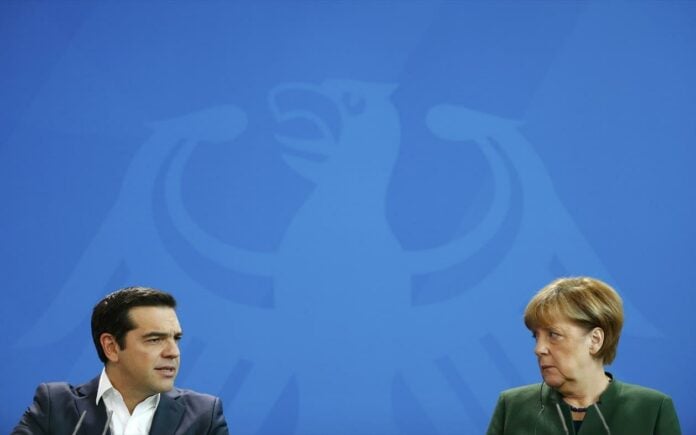German Chancellor Angela Merkel reiterated on Friday, albeit in an affable tone, that decisions on the Greek bailout program are not taken in Berlin but at the Eurogroup setting, a statement with Greek Prime Minister Alexis Tsipras standing next to her at a joint appearance before television cameras and just prior to one-on-one talks.
She did add that she’ll have a first-hand opportunity to listen to the increasingly embattled Greek premier’s views on the program.
Merkel said Greek-German cooperation is now characterized by “good and close relations”, while ticking off a list of matters to be discussed, including the ongoing refugee/migrant crisis plaguing Greece, which comes within the framework of the overall EU-Turkey agreement to deal with the problem.
She also mentioned the Cyprus issue and talks to find a solution to the decades-old problem of division of the island, a statement that signals a more pronounced German involvement regarding an issue that Berlin previously kept at an arm’s length.
Merkel acknowledged that Athens has faced and is facing a disproportionately high cost in terms of the migrant crisis, with thousands of Third World nationals still trapped in Greece.
“We are trying to support Greece… we want a fair distribution of refugees to Europe, we can’t leave Greece alone to its fate,” she said, adding that the agreement with Turkey was not developing as she’d like, whereas the NATO presence in the Aegean is a good way to combat migrant smugglers.
Tsipras thanked Merkel for the opportunity to exchange views in person, saying relations with Berlin are characterized by a “sincere exchange” in opinions between the two EU states.
Speaking in broader terms, he called for a “new vision” for Europe, based, as he said, on courageous decisions, good faith, mutual respect between partners, ” in order to avoid further uncertainty and consolidate security.” He also referred to a “common threat from rise of xenophobic and racist voices in Europe. “
Greece-Turkey relations within the prism of the migration problem, the Cyprus issue and the Greek bailout program will be on the agenda of talks, he said.
Interestingly enough, Friday’s initial comments in Berlin included an increased mention of Turkey, with Tsipras saying citing difficulties in relations with Ankara after the July coup, “I believe they are experiencing a tense period,” was his reasoning.
Along these lines, he pointed to “negative effects” from a resurgent nationalist language emanating from official Ankara, especially with recent revisionary statements over the landmark 1923 Lausanne Treaty. He added that Greece continues to support Turkey EU accession path in tandem with a full compliance of criteria and adherence to the migrant re-admission protocol.
negative results from nationalism in neighboring country and disputes of Lausanne treaty, won’t accept challenges to our sovereign rights… consider must defend European values and cooperation; Greece in
Finally, he said Turkey’s volition to support a viable and just solution to Cyprus issue will soon be ascertained, reminding that Athens is backing a solution without third country guarantees and occupation troops.














